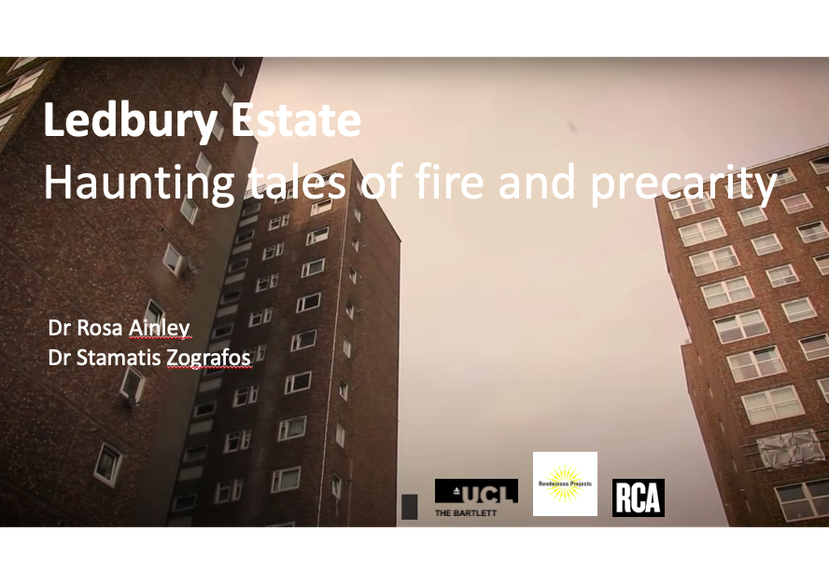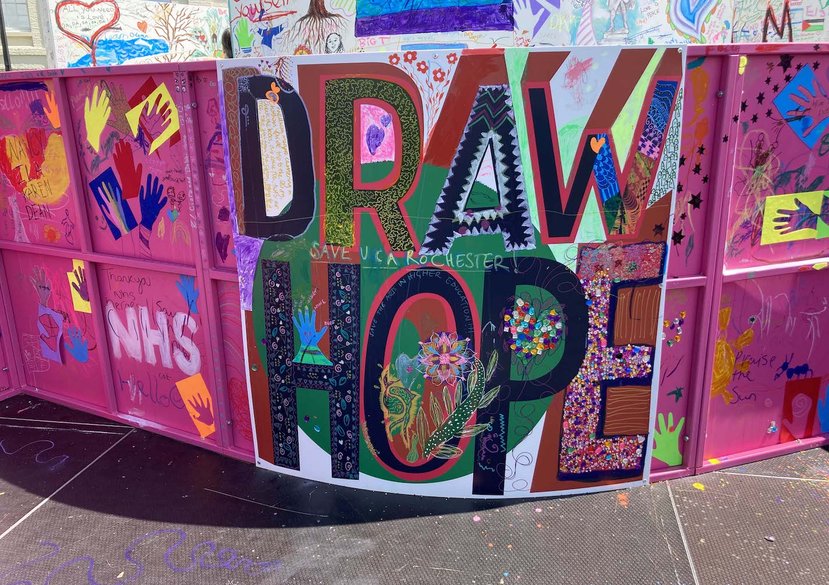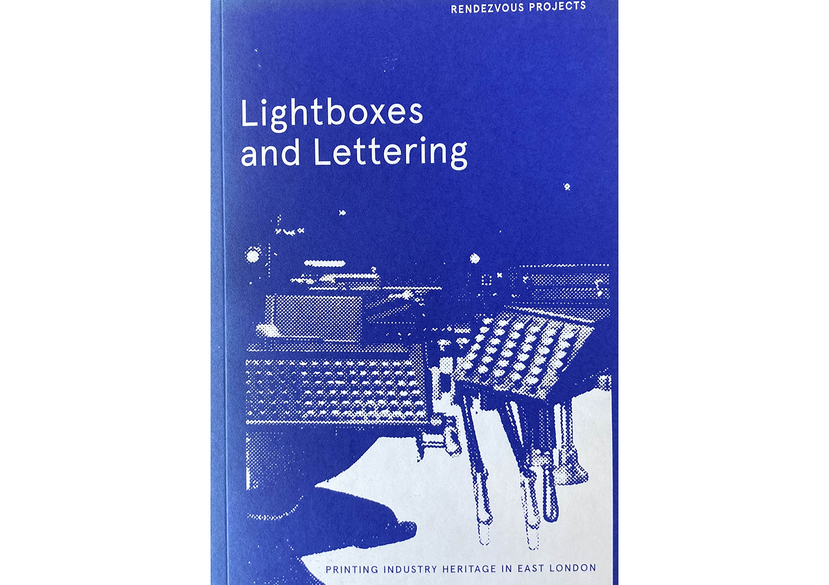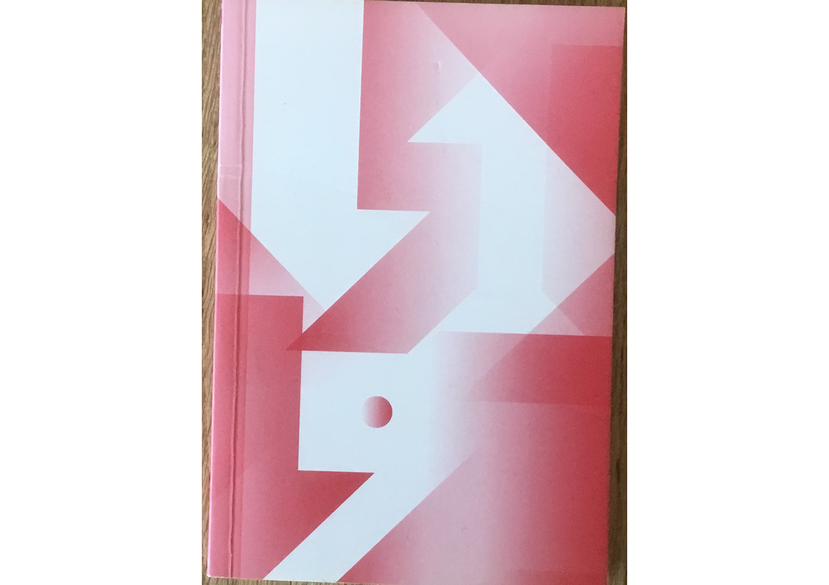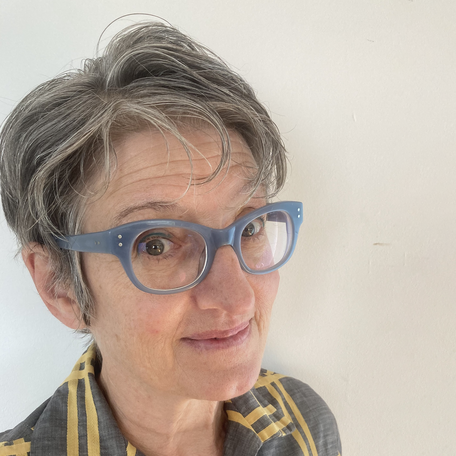
Dr Rosa Woolf Ainley
- Associate Lecturer
- Communication Design Pathway
- Programme Leader
-
PGR Architecture Writing Programme.
Rosa is a text-based artist and researcher, using experimental processes and forms to write buildings and architecture.
Rosa has worked at the RCA mainly in the School of Communication (MRes Communication Design) and the School of Architecture (PGR Writing Programme) since completing her AHRC-funded PhD by practice in Architecture, ‘Writing Alexandra Palace: Plurivocity as a method of cultural recovery’ at the RCA in 2016.
She has an extensive publications record that ranges across academic and the arts. Her projects, individual and collaborative, also span both environments.
Key details
School, Centre or Area
Gallery
More information
Research Interests
Rosa’s research interests across forms and applications of architecture writing include: shifting patterns of community/ties, notions of home and attachment to place; translations and representations across text and image using AI and AR; design, creation, ownership and welcoming in public space; and adaptive reuse and regenerative practices in the urban environment. A significant feature within her areas of specialism is creating spaces – physical, digital, on the page, on the wall – for the expression of voices usually muted, bypassed, unheard in relation to redevelopment of neighbourhoods, local spaces and buildings.
Practice
Working across print and digital, across academia and art environments and across architecture and arts generally, Rosa uses text, audio and image, as a means of creating and exploring buildings and spaces and how people use or would like to use them. She writes with and about the people and spaces involved, to articulate their interests, ideas and concerns. This kind of active participation, which is a foundation of her practice, is redesigned for every project in order to respond to the specifics of the populations, localities and structures involved.
Her publications record ranges from the novel to short story to creative nonfiction to journalism, in academic and mainstream media. She publishes too on music, gender, feminism and sexuality; she also writes and edits for architecture practices, arts organisations as well as individual practitioners.
She is a Co-Director of Rendezvous Projects, a Community-Interest Company focused on participatory social histories of place and related industries and cultures.
Research Funding
Rosa has been funded and commissioned by arts and strategic organisations including Arts Council England (2022; 2007); with Dr Stamatis Zografos, Architecture Research Fund, Bartlett School of Architecture, UCL (2022); Estuary 2021 (DCMS-funded festival), Ideas Lab (2021/22), Whitstable Biennale (2014, 2016), AHRC (2012–15), CABE (2009–11) and RIBA South East (2007).
Awards
Royal Society for Public Health, Arts and Public Health Commendation for Leysdown Rose-tinted, Vision for Leysdown 2011
Research Associate, Sidney de Haan Centre for Arts and Health, Canterbury Christchurch University
Current and Recent Projects
Ledbury Estate: Haunting tales of fire and precarity, with Stamatis Zografos, Bartlett 2022–
This project focuses on Ledbury Estate, Peckham, an estate that doesn’t meet fire and structural safety requirements but was used as emergency temporary accommodation for homeless families. We directly engaged with estate tenants through individual and group activities (including writing, drawing and filming workshops), to record their sense of place, their ‘collective psyche’. The outcome will form the background research for a contribution to Zografos’s seed-funded collaborative project supported by the British Academy ‘Confronting Urban Violence: Global Interdisciplinary Investigations’, which was presented by us in two symposia –at QMC, London and DF, Brasilia – and will lead to an edited publication.
Sounding Louder: Experimentation, skills and mentoring, Developing Your Creative Practice, Arts Council England 2022
This award is about funding time and resources to scale up my work and explore new collaborations so that I can take forward more significant opportunities, developing both my career and my practice through collaborations, developing wide-reaching and large-scale new work and skills development.
The grant is also giving me time and space to experiment with developing my writer’s voice/s further in ways suitable for audio and to create text ‘assets’ for AR use.
AR ‘scapes: Voices from the concrete barges, Creative Estuary Ideas Lab, 2021–
With collaborators Kate MacLean and Rich Perks (UKent), the project seeks to establish ways to access and disseminate concepts of ‘future heritage’ and ‘multiple-perspective local heritage’ through creative technologies and media, with a focus on the concrete barges and surrounding forms of nature (including pipets, water rats and voles) at Rainham Marshes, Essex. Many local sites of interest go unnoticed, especially to local populations, this project seeks to draw attention to such a place, its inhabitants and its ‘scapes.
Research: Practice-based / site-specific / local human and non-human inhabitant narratives / in-situ writing and recording / development of prototype ‘Activity Pack’ to yield creative input from local residents, students etc
Analysis and reflection: On developing speculative heritage and experimental methods and forms / environmental approaches to non-human perspectives
Artistic output: Prototype AR experience of concrete barge site. Multidisciplinary output, combining text, soundscapes, sound-art, illustration and image with modern technologies.
Workshop artist, Draw Hope pavilion, Estuary Festival/Cement Fields, 2021
A shared public artwork that created a temporary public space, a document of drawing and writing by (mainly) people in Chatham, Kent, where the pavilion, by Bob and Roberta Smith, was based, and Estuary Festival visitors, led by estuary-based arts organisations, Metal (South Essex) and Cement Fields (North Kent). Rosa was one of six artists running workshops at and on the pavilion, which were offered to LBGTQI+ communities and to local students.
The open-access structure was effectively a blank page or a blank canvas on which people could freely make their mark, creating a public artwork, and demonstrating a sense of ownership.
Publications, Exhibitions and Other Outcomes
Publications
Woolf Ainley, R. (forthcoming) 2023. The Alphabet Tax, GrandIota
Harrison, L, Ainley, R. 2020 Lightboxes and Lettering, Rendezvous Press
Ainley, R. 2016. Answers on a postcard please, Kent County Council/Whitstable Biennale
—2014/15. Building 519 and other Pfizer tales, text booklet/audio installation, Whitstable Biennale and Spike Island, Bristol
Chapters, articles, exhibition texts:
Ainley, R. (forthcoming) 2020. ‘Everyday Extraordinary: Familiar strangers in our backyard’. In M. Mueller, ed., Atlas: An intimate inventory of brutalist architecture in Stuttgart, pp86–102
Ainley, R. Excerpts from ‘Everyday Extraordinary: Familiar strangers in our backyard’, in (2022) Concrete Poetry: Brutalism in Stuttgart, photographs by Sue Barr, Hartmann Projects gallery, Stuttgart, Germany
— 2022. Book review: A Certain Logic of Expectations, Arturo Soto, photomonitor https://photomonitor.co.uk/book/a-certain-logic-of-expectations/
— 2022. Entry on muf art/architecture. In: L Brown and K Burns, eds.The Bloomsbury Global Encyclopedia of Women in Architecture
— 2020. ‘Looking back again and forward; Re: review and reconstruction in writing and architecture’, Architecture & Culture, T+F
— 2018. ‘A Cacophony of the Unheard and the Yet-to-Be’: Voicing the Lost and Found in the People’s Palace for Future Renewal’. In: K Havik, S Oliveira, et al, eds. Writingplace No. 2 Inscriptions and Tracing Place https://doi.org/10.7480/writingplace.2
— 2017. ‘Tributaries, Flow and an Extraordinary Alchemy: Women at the AA in the 1980s and 1990s’. In: L Walker and E Darling, eds. AA Women in Architecture 1917–2017, AA Publications
— 2017. ‘What’s the story?’. In: A Kaasa and H Gavin, eds. Un/Common Building, Collective Excavation of a Fictional Structure, Theatrum Mundi/University of Sheffield
— 2014. ‘A Babble of Allusions’ and ‘Future Past Tense’. In: H Barekat and A Hugill, eds. Politics by Other Means: Selected Criticism from Review 31, Zer0 Books
External collaborations and activities
(2019–) Board member, Architecture + Culture journal
(2014–) Co-Director, Rendezvous Projects, a Community-Interest Company focused on participatory social histories of place and related industries and cultures.
